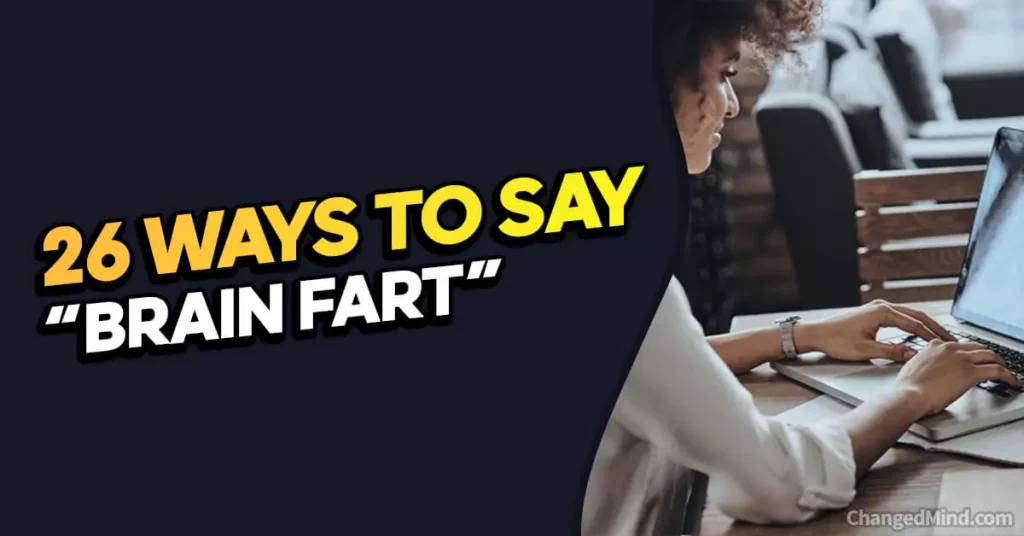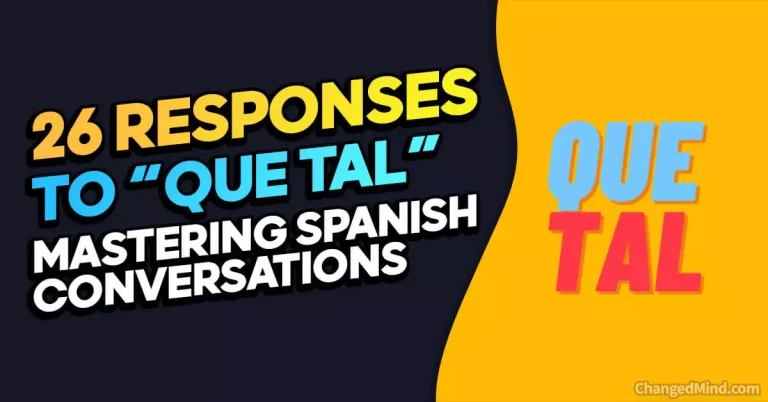Ever had a “brain fart” moment that left you grasping for words? Don’t worry; you’re not alone!
We’ve all been there, but fear not, because in this article, we’re about to unleash a treasure trove of linguistic gems.
In just a moment, you’ll discover 26 other ways to say “brain fart” that will not only rescue you from awkward silences but also make you the life of the party!
From hilarious idioms to quirky phrases, we’ve got it all. So, get ready to expand your vocabulary, impress your friends, and never stumble on words again.
Let’s dive into the world of linguistic creativity!
In this article, we’ll explore:
- Fun alternatives for “brain fart.”
- Playful idioms that’ll leave you in stitches.
- Quirky phrases to spice up your conversations.
- How to choose the perfect expression for any situation.
- The secret to becoming a word wizard.
Stay tuned, because by the end, you’ll be armed with a linguistic arsenal that’ll leave everyone saying, “Wow, you’ve got quite the vocabulary!”
So, without further ado, let’s embark on this wordy adventure together!
Understanding the Term “Brain Fart”
The term “brain fart” is a colloquial and informal expression used to describe a temporary mental lapse or moment of forgetfulness. It refers to those moments when you can’t remember something you should know or experience a temporary inability to think clearly.
While the term may sound humorous, it can be frustrating when it happens.

Why Do People Seek Alternatives?
People may seek alternative ways to describe a “brain fart” for various reasons. Some may find the term crude or inappropriate in certain settings, such as professional or formal environments.
Others may simply prefer using different expressions or synonyms to add variety to their language or to make their conversations more interesting.
Synonyms for “Brain Fart”
There are several synonyms for “brain fart” that can be used to convey a similar meaning. Some of these alternatives include:
- Mental Lapse: Refers to a temporary failure in memory or attention.
- Mind Blank: Describes a moment when one’s mind goes completely empty or devoid of thought.
- Cognitive Slip: Indicates a temporary interruption in cognitive processes.
- Thought Block: Describes a sudden inability to articulate one’s thoughts or ideas.
- Mental Hiccup: References a brief interruption or glitch in one’s mental functioning.
- Knowledge Gap: Suggests a momentary lack of knowledge or understanding in a particular area.
- Memory Glitch: Refers to a sudden malfunction or failure in memory recall.
- Intellectual Blip: Describes a momentary lapse or disturbance in intellectual functioning.
Idiomatic Expressions Related to Forgetfulness
In addition to synonyms for “brain fart,” there are also idiomatic expressions that capture the essence of forgetfulness. These expressions often describe moments when one’s memory or thinking processes falter. Some examples include:
- Senior Moment: A light-hearted way of referring to memory lapses, commonly associated with older individuals.
- Tip-of-the-Tongue Phenomenon: Describes the feeling of knowing a word or information but having difficulty retrieving it.
- Absent-mindedness: Refers to a state of being preoccupied or forgetful due to inattentiveness.
- Mind Going Blank: Indicates a sudden loss of thought or the inability to remember something.
- Memory like a Sieve: Describes a poor memory, often implying forgetfulness or the inability to retain information.
By using these alternative expressions, individuals can effectively convey moments of forgetfulness or mental lapses while choosing a term that feels suitable for the context or personal preference.
Key takeaways:
- Mental Lapse: An alternative term for “brain fart” that describes a temporary error or failure in memory or judgment.
- Tip-of-the-Tongue Phenomenon: Another way to express “brain fart,” referring to the feeling of knowing something but struggling to retrieve it from memory.
- Cognitive Slip: A synonym for “brain fart” that describes a momentary lapse in cognitive function, resulting in a mistake or forgetfulness.
26 Other Ways to Say “Brain Fart”
Here are 26 other ways to say “Brain Fart”:
- Mental lapse
- Thought hiccup
- Mind freeze
- Cognitive hiccup
- Idea block
- Intelligence lapse
- Knowledge slip
- Brain glitch
- Memory lapse
- Intellectual stumble
- Idea blackout
- Mental hiccup
- Thought lapse
- Cognitive blip
- Idea freeze
- Intelligence blunder
- Brain hiccup
- Memory glitch
- Intellectual brain freeze
- Thought malfunction
- Mental hiccup
- Cognitive malfunction
- Knowledge hiccup
- Idea stutter
- Thought malfunction
- Mental stutter
Now you have a variety of creative alternatives to use instead of “brain fart” in different situations!
What is a more formal word for when you have a “brain fart”?
Here is a list of 26 more formal terms or phrases for when you experience a momentary lapse in cognitive function:
- Mental lapse
- Cognitive lapse
- Intellectual hiccup
- Memory lapse
- Thought interruption
- Momentary mental lapse
- Brief cognitive lapse
- Transient mental lapse
- Temporal cognitive lapse
- Mind blip
- Mental glitch
- Cognitive hiccup
- Mental hiccup
- Cerebral misstep
- Intellectual falter
- Momentary lapse of reason
- Short-term cognitive lapse
- Temporal intellectual lapse
- Transient memory lapse
- Thought stutter
- Brief intellectual lapse
- Mental stammer
- Cognitive stammer
- Momentary lapse in concentration
- Temporal mental hiccup
- Transient thought interruption
These phrases can be used in more formal or professional contexts to describe temporary lapses in one’s mental processes or memory.
Understanding the Term “Brain Fart”
When it comes to understanding the term “brain fart,” it refers to a temporary mental lapse or momentary forgetfulness. “Understanding the term ‘brain fart'” is important to grasp the concept which describes situations when someone experiences a brief lapse in concentration or memory.
This term, “brain fart,” is commonly used in informal conversations and is meant to convey a sense of humor rather than a serious medical condition.
To better comprehend the term “brain fart,” consider it as a metaphorical way to describe the moment when thoughts seem to momentarily escape from one’s mind, leading to a temporary inability to recall information or perform a task.
It is vital to understand the term “brain fart” as it provides a relatable and light-hearted way to acknowledge these small lapses in mental agility that everyone experiences from time to time.
By gaining an understanding of the term “brain fart,” individuals can recognize and normalize these moments of forgetfulness, knowing that they are a natural part of being human.
So, next time you have a “brain fart,” remember that it is common and nothing to be overly concerned about.
Why Do People Seek Alternatives?
People seek alternatives to the phrase “brain fart” for a variety of reasons. First and foremost, some individuals may find the term crude or vulgar, and therefore prefer a more polite and professional alternative in their language.
Others actively search for different expressions to avoid offending or embarrassing others, as they recognize that the term may be considered inappropriate or insensitive in certain contexts.
By utilizing alternative phrases, individuals can add variety and creativity to their language, ultimately enhancing communication and preventing unnecessary repetition.
Moreover, certain individuals may opt for alternative phrases in order to convey a more accurate or specific meaning, depending on the situation at hand. This demonstrates their desire to effectively communicate their thoughts and ideas.
It is also worth noting that people may seek alternative expressions to adhere to societal norms and expectations of polite conversation.
Being aware of the reasons behind why people seek alternatives to certain phrases allows for greater adaptability and sensitivity in communication.
Synonyms for “Brain Fart”
Have you ever experienced that frustrating moment when your mind goes blank? Yeah, we’ve all been there. In this section, we’ll dive into a treasure trove of alternative ways to describe this phenomenon – those cringe-worthy “brain farts.”
From mental lapses to cognitive slips, we’ll explore an array of colorful synonyms that capture the essence of those temporary memory glitches and intellectual blips.
So, get ready to expand your vocabulary and spice up your conversations when discussing those all-too-relatable moments of mind blanks.
1. Mental Lapse
A mental lapse, also known as a temporary period of forgetfulness or a momentary failure to remember something, is a common occurrence that can happen to anyone. It is often caused by factors such as stress, fatigue, or distractions.
Mental lapses can range from minor instances, like forgetting where you placed your keys, to more significant ones, like forgetting an important deadline or appointment.
Despite their temporary nature, mental lapses do not indicate any underlying cognitive issues.
To overcome mental lapses, it is crucial to practice good mental habits. This includes getting enough sleep, managing stress levels, and staying organized.
Additionally, engaging in activities that support brain health, such as regular exercise and mental stimulation, can be beneficial in reducing the frequency of mental lapses.
By understanding that mental lapses are a normal occurrence, we can cultivate patience and forgiveness for ourselves and others when these moments happen. It’s important to remember that occasional mental lapses are part of human nature and do not define our intelligence or capabilities.
2. Mind Blank
Mind blank refers to a temporary state of mental block or inability to think clearly or remember information. It can occur due to stress, fatigue, anxiety, or even certain medical conditions.
When experiencing a mind blank, follow these steps to regain your focus:
- Take a deep breath and try to relax your mind.
- Remove distractions from your surroundings to create a conducive environment for clear thinking.
- Engage in a physical activity or take a short walk to stimulate blood flow to the brain.
- Practice mindfulness or meditation techniques to calm your mind and enhance concentration.
- Break down tasks into smaller, manageable chunks to make them more approachable.
- Use visual aids or write down key points to help trigger your memory and organize your thoughts.
Pro-tip: Incorporate regular breaks, sufficient sleep, and a healthy diet into your routine to optimize cognitive function and reduce the occurrence of mind blanks.
3. Cognitive Slip
When it comes to understanding cognitive slips, it is important to recognize the common signs and take necessary steps to prevent them. Here are some steps to address cognitive slips:
- Be Mindful: Pay attention to your thoughts and actions, and be aware of any errors or lapses.
- Practice Mindfulness: Engage in mindfulness exercises like meditation or deep breathing to improve focus and reduce distractions.
- Manage Stress: High levels of stress can contribute to cognitive slips. Find healthy ways to manage and reduce stress in your daily life.
- Get Enough Sleep: Lack of sleep can impair cognitive function and increase the likelihood of slips. Aim for 7-8 hours of quality sleep each night.
- Exercise Regularly: Physical exercise not only improves overall health but also enhances cognitive abilities, including memory and attention.
- Stay Organized: Use tools like calendars, planners, or reminders to keep track of important tasks and deadlines.
- Take Breaks: Give yourself regular breaks during mentally demanding tasks to prevent fatigue and maintain focus.
- Stay Engaged: Keep your mind active by engaging in activities that challenge cognitive abilities, such as puzzles, reading, or learning a new skill.
One notable case of cognitive slip occurred during the 2003 blackout in the United States. Due to a technical error, a crucial alarm system failed to notify operators about the impending power issues, resulting in a widespread blackout affecting millions of people across several states.
This incident highlighted the importance of recognizing and addressing cognitive slips in critical systems to prevent significant disruptions.
4. Thought Block
A thought block, also known as a cognitive slip or a mind blank, occurs when there is a temporary interruption or inability to access a specific thought or piece of information. This can happen in various situations, such as during conversations, exams, or public speaking.
To describe this experience, we can use the term “thought block” interchangeably with other synonyms like mental lapse, memory glitch, or intellectual blip. These terms all refer to a momentary failure of memory or thinking.
Additionally, a thought block can be compared to a memory hiccup, which is an intermittent or brief disruption in the retrieval or recall of information. By understanding and using these keywords, individuals can better communicate their experiences of temporary memory or cognitive difficulties.
5. Mental Hiccup
A mental hiccup, also known as a “brain fart,” is a momentary lapse in cognitive functioning where a person temporarily forgets or experiences difficulty recalling information. Mental hiccups, which are commonly referred to as brain farts, can occur for various reasons, such as stress, fatigue, distraction, or simply a momentary lapse in concentration.
During a mental hiccup, individuals may find it challenging to remember names, dates, or even simple tasks. It can be frustrating and embarrassing, particularly in social or professional settings.
To overcome mental hiccups, some techniques can be helpful. Taking a moment to pause and relax, deep breathing exercises, and engaging in activities that promote mental clarity, such as meditation or exercise, can be effective strategies.
It’s important to remember that mental hiccups, also known as brain farts, are normal and happen to everyone from time to time. Recognizing that they are a temporary phenomenon and not indicative of overall cognitive abilities can help alleviate any unnecessary stress or anxiety.
So, the next time you experience a mental hiccup, also known as a brain fart, take a deep breath, and remember that it’s just a temporary blip in an otherwise sharp mind.
6. Knowledge Gap
- A knowledge gap, which refers to a lack of information or understanding in a particular area or subject, can occur when there is missing knowledge or a lack of expertise in a specific topic.
- Identifying and recognizing a knowledge gap is essential for personal and professional growth, as it allows individuals to understand areas where they need to acquire more knowledge or skills.
- To fill a knowledge gap, one can actively seek out educational resources such as books, courses, or online tutorials that cover the specific subject of interest.
- Besides, engaging in discussions, networking with experts, or attending workshops related to the subject can also contribute towards bridging the knowledge gap.
- Continuous learning and staying updated with the latest research and developments help prevent knowledge gaps from forming and ensure individuals stay well-informed.
- A knowledge gap can hinder problem-solving or decision-making processes; therefore, it is crucial to actively address and resolve them to enhance overall competency.
Bridging a knowledge gap not only enhances one’s understanding and skills but also boosts confidence and opens up new opportunities for growth. It is important to embrace a lifelong learning mindset and actively seek knowledge to stay ahead in an ever-changing world.
7. Memory Glitch
When it comes to memory glitches, there are a few steps you can take to improve your recall and minimize forgetfulness:
- Stay organized: Use calendars, to-do lists, and reminder apps to keep track of important dates, tasks, and deadlines.
- Practice mindfulness: Pay attention to what you are doing and fully engage in the present moment to avoid distractions and increase focus.
- Get enough sleep: Lack of sleep can impair memory and cognitive function, so be sure to prioritize getting a good night’s rest.
- Exercise regularly: Physical activity has been shown to enhance memory and cognitive abilities, so make sure to incorporate regular exercise into your routine.
- Brain-boosting activities: Engage in activities that stimulate your brain, such as puzzles, reading, learning a new skill or language.
- Reduce stress: High levels of stress can negatively affect memory and cognitive function, so find healthy ways to manage and reduce stress levels in your life.
- Stay mentally active: Keep your brain challenged and engaged by learning new things, participating in intellectually stimulating activities, and engaging in social interactions.
Throughout history, memory glitches, also known as “memory glitch”, have been a common human experience. One such famous memory glitch occurred in 1945 when President Harry Truman forgot to mention the newly formed United Nations in a speech. This memory lapse caused quite a stir and highlighted the universal nature of memory glitches, even among influential individuals.
8. Intellectual Blip
When it comes to forgetfulness or lapses in thinking, one term often used is “brain fart” or “intellectual blip.” These terms are synonymous and refer to a temporary lapse in thinking or memory. This phenomenon can result in forgetfulness or difficulty in recalling information.
Other idiomatic expressions related to forgetfulness include “senior moment,” “tip-of-the-tongue phenomenon,” “absent-mindedness,” “mind going blank,” and having a “memory like a sieve.”
It is important to note that these lapses in thinking, also known as intellectual blips or brain farts, are common and can happen to anyone. Factors such as stress, fatigue, and multitasking can contribute to these temporary lapses. If you find that these lapses become more frequent or start affecting your daily life, it may be worth seeking professional advice.
Idiomatic Expressions Related to Forgetfulness
Feeling a bit forgetful? Don’t worry, we’ve got you covered! In this section, we’ll dive into a treasure trove of idiomatic expressions that people use to describe forgetfulness. From those “senior moments” to the frustrating “tip-of-the-tongue phenomenon,” we’ll uncover various ways to express forgetfulness. Whether it’s absent-mindedness, moments of mind going blank, or having a memory like a sieve, these colorful phrases capture the nuances and frustrations of forgetfulness with a touch of humor. Get ready to explore the quirks of our memory!
1. Senior Moment
A “senior moment” is a phrase used to describe a momentary lapse in memory or cognitive functioning, commonly associated with elderly individuals. It pertains to occasions when someone, particularly of advanced age, experiences difficulties in remembering or recalling information that they would typically remember.
These moments are typically benign and regarded as a normal aspect of the aging process. They can be triggered by various factors, including stress, fatigue, medication, or the natural cognitive changes that occur in the brain over time.
Senior moments are often characterized by brief pauses in memory, such as forgetting someone’s name, misplacing objects, or experiencing difficulty in recalling recent events. Despite being frustrating, they generally do not warrant significant concern.
To effectively manage senior moments, individuals can partake in activities that promote brain health. These activities may include regular exercise, maintaining a healthy diet, and engaging in cognitive exercises such as puzzles or memory games. Additionally, staying organized and utilizing tools like calendars or reminder apps can help mitigate the impact of memory lapses.
2. Tip-of-the-Tongue Phenomenon
When it comes to moments of forgetfulness, the tip-of-the-tongue phenomenon is a common occurrence. The tip-of-the-tongue phenomenon refers to the experience of having a word or phrase “on the tip of your tongue” but struggling to recall it. It can be frustrating and often happens when we are trying to retrieve specific information from our memory.
The tip-of-the-tongue phenomenon can be triggered by various factors, such as stress, fatigue, or simply the complexity of the information being retrieved. Research suggests that the tip-of-the-tongue phenomenon occurs less frequently with age, as older adults tend to have more experience and strategies for compensating for memory lapses.
There are strategies to overcome the tip-of-the-tongue phenomenon, such as taking a moment to relax, trying to recall related information, or even using external cues like looking up the word or asking someone for help. These tactics can aid in the retrieval process and reduce frustration.
Understanding the tip-of-the-tongue phenomenon can help individuals navigate moments of forgetfulness and find effective ways to retrieve information from their memory.
3. Absent-mindedness
Absent-mindedness is a frequent occurrence where individuals experience forgetfulness or easy distractions due to preoccupation or a lack of focus. It is characterized by lapses in memory, attention, and organization. Symptoms may include forgetting appointments or important dates, misplacing items, or daydreaming during conversations. Various factors, such as stress, fatigue, multitasking, or simply having a naturally more forgetful disposition, can cause absent-mindedness.
To overcome absent-mindedness, individuals can employ strategies such as creating reminders or to-do lists, practicing mindfulness techniques to improve focus, and establishing routines to enhance organization. Adopting healthy lifestyle habits, such as getting sufficient sleep, exercising regularly, and maintaining a balanced diet, can also contribute to better cognitive function.
In a true story, a friend of mine who struggled with absent-mindedness found that setting alarms and using reminder apps on their phone helped them stay on track with their daily tasks. They also noticed that practicing meditation and taking short breaks throughout the day helped improve their overall focus and reduce forgetfulness. By implementing these strategies, they were able to cultivate greater mindfulness and alleviate the effects of absent-mindedness in their daily life.
4. Mind Going Blank
When experiencing a “mind going blank” moment, there are several steps you can take to regain your focus and thinking abilities:
- Pause and take a deep breath to calm your mind.
- Close your eyes for a moment and try to relax.
- Attempt to recall any relevant information or cues that may trigger your memory.
- If necessary, remove yourself from any distractions or noisy environments that can contribute to your mind going blank.
- Engage in mental exercises such as visualization or association to stimulate and improve your memory.
- Take a break and participate in a different activity to give your mind a chance to reset and recover.
- Stay hydrated and ensure you are getting enough rest and sleep to support your cognitive function.
- Consider seeking professional help if you are frequently or severely experiencing episodes of your mind going blank.
5. Memory like a Sieve
Memory like a sieve is an idiomatic expression that aptly describes the tendency to easily forget things or have a weak memory retention. It vividly illustrates that the memory is akin to a sieve filled with holes or leaks, causing information to easily slip through.
This is a common and often frustrating experience for many individuals, as it hinders the ability to recall significant details or retain important information.
If you frequently find yourself grappling with a memory like a sieve, there are several effective strategies that can potentially enhance your memory retention. These strategies include:
| 1. | Utilizing mnemonic devices or memory techniques to facilitate the remembrance of information. |
| 2. | Breaking down complex information into smaller, more manageable chunks. |
| 3. | Engaging in regular mental exercises, like puzzles or memory games, to actively stimulate the brain. |
| 4. | Establishing a consistent routine and relying on reminders or cues to aid in remembering crucial tasks or appointments. |
| 5. | Prioritizing sufficient sleep, as it plays a vital role in consolidating memory. |
By implementing these strategies, you have the opportunity to boost your memory and decrease the frequency of experiencing moments reminiscent of a “memory like a sieve.”
Some Facts About Other Ways to Say “Brain Fart”:
- ✅ “Drawing a blank” is a professional way to say “brain fart” and means failing to remember something. (Source: Our Team)
- ✅ “Scatterbrain” is an informal way to say “brain fart” and refers to someone who is disorganized or lacking in concentration. (Source: Our Team)
- ✅ Alternative phrases to use instead of “brain fart” include “absent-minded” and “forgetful”. (Source: Our Team)
- ✅ “Brain fart” is an accepted term in English but should be avoided in formal settings. (Source: Our Team)
- ✅ Using alternative phrases can help avoid a “brain fart” and create humor in informal situations. (Source: Our Team)
Frequently Asked Questions
What are some synonyms for “brain fart”?
Some synonyms for “brain fart” include “synapse lapse,” “drawing a blank,” “neuron misfiring,” “mental aberration,” “temporary lapse,” and “thinko.”
Can I use these alternative phrases in formal contexts?
No, these alternative phrases are more suitable for less formal situations and should be avoided in professional correspondence.
Are there any offensive alternatives to “brain fart”?
Yes, phrases like “a blonde moment” or “cranial rectal inversion” can be offensive and should be avoided.
What does “drawing a blank” mean?
“Drawing a blank” is a professional way to say “brain fart” and refers to failing to remember something or experiencing a temporary loss of memory.
What is the origin of the term “brain fart”?
The term “brain fart” is an accepted term in English and was recognized by the Oxford Dictionary in 2015. Its exact origin is unclear.
Can you provide example sentences using these alternative phrases?
1. “I had a synapse lapse and couldn’t remember her name.”
2. “He was temporarily forgetful and had a mental aberration during the presentation.”
3. “She experienced a neuron misfiring and couldn’t recall the answer.”
4. “I often have a thinko and make silly mistakes.”
5. “I was at a loss and had a momentary drawing a blank.”






